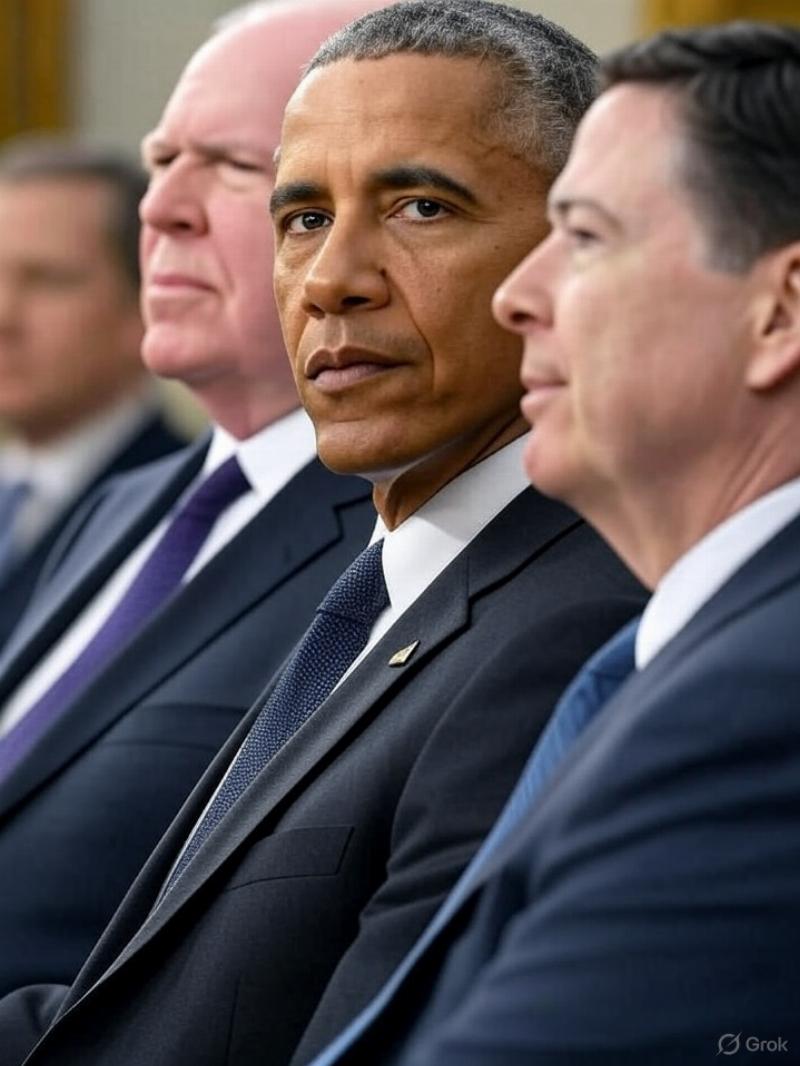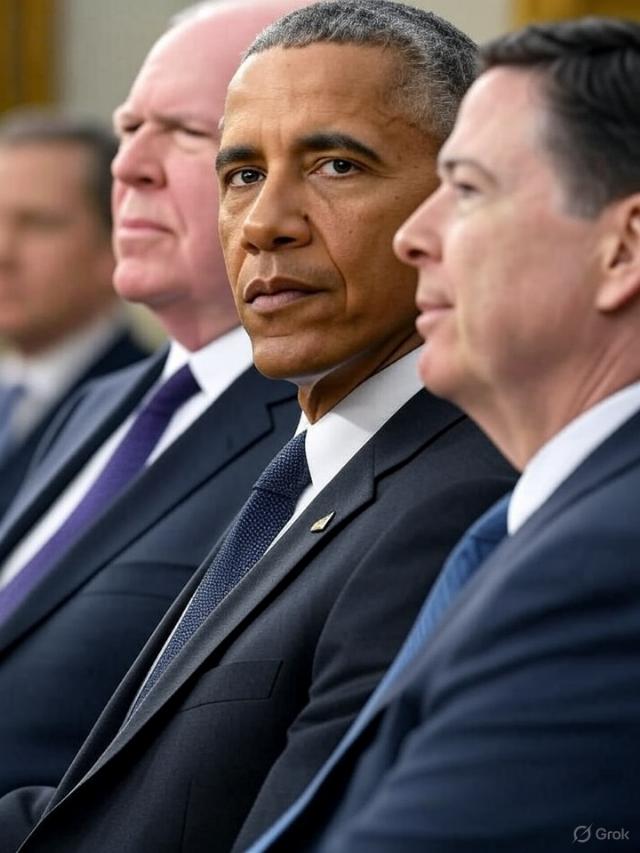


Late last week, the Office of the Director of National Intelligence released a cache of previously classified records shedding new light on the origins of the Russia collusion narrative.
These documents raise serious questions about whether the American public was deliberately misled during the twilight days of the Obama administration, in what now appears to have been a coordinated effort to undermine the incoming Trump presidency before it even began.
Discussing these new revelations, Tulsi Gabbard—now Director of National Intelligence—expressed disbelief that special counsels Robert Mueller and John Durham failed to uncover what she calls a “years-long coup” against President Trump.
As Gabbard put it,
I don’t know what excuse there is for those who supposedly investigated this previously, whether it was Durham or others, that they were not able to put together the dots and ultimately show the truth to the American people.
Gabbard emphasized, “There is no rational or logical explanation for why they failed,” suggesting either gross oversight or willful concealment. She is now urging Attorney General Pam Bondi and FBI Director Kash Patel to pursue criminal referrals and indictments.
Washington was still in a stupor in the weeks following the shocking—at least to some—election of Donald J. Trump as the 45th President of the United States. Precisely a month after Election Day, the next chapter of the story began.
On December 8, 2016, President Obama was scheduled to receive a classified President’s Daily Brief (PDB) the following day, which would assess Russian interference in the 2016 election.
The verdict? “Russian and criminal actors did not impact recent U.S. election results” through cyber means. The Intelligence Community (IC) expressed only “low-to-moderate confidence” that any foreign operation had even attempted to tamper with election infrastructure.
The facts were clear: no votes had changed, and no election systems had been breached.
Before December 8, internal IC consensus held that Russia lacked both the intent and the capability to corrupt the vote. A September 12 Intelligence Community Assessment (ICA) had concluded that foreign adversaries “do not have and will probably not obtain the capabilities to successfully execute widespread and undetected cyberattacks” on U.S. election infrastructure.
Yet by mid-December, the CIA publicly attributed intent not merely to disrupt but to help Trump win—a stark departure from what agencies, including the FBI and CIA, had privately concluded.
And that original PDB never reached the Resolute Desk.
Just hours before the briefing was scheduled for delivery, the FBI abruptly withdrew its support for the draft. Agents demanded that the Bureau’s seal be removed and sought to affix an official dissent.
Then came a directive from on high: cancel the report. A new assessment would be created—this time, “per the President’s request.”
The next day, December 9, the Obama administration convened its national security team in the Situation Room. Attendees included CIA Director John Brennan, DNI James Clapper, National Security Advisor Susan Rice, Deputy AG Sally Yates, and others—a who's who of the Obama foreign policy inner circle.
That same day, selective leaks appeared in the Washington Post claiming that the CIA had concluded Russia intervened in the election to help Donald Trump.
Intelligence officials now began attributing the DNC and DCCC hacks to Vladimir Putin directly—in contradiction to prior assessments. Soon after, the FBI joined the chorus.
Yet, despite the complete about-face, the underlying intelligence remained unchanged. What changed was the narrative—now being aggressively peddled in Washington.
And this new narrative laid the cornerstone for unrelenting attacks on Donald Trump and his administration throughout his first term. It lent credence to talking points that still resonate today.
Why did the narrative flip? Because the new political reality demanded it.
This shift allowed the outgoing administration to cast doubt on Trump’s legitimacy before he even took the oath of office.
Then, on January 6, 2017—two weeks before the Inauguration and on the day for the tallying of the Electoral College votes, a declassified Intelligence Community Assessment was released to the public, asserting that Russian President Vladimir Putin had personally directed an operation to influence the 2016 election in Trump’s favor.
One of the sources used to justify the abrupt course change? The discredited Steele dossier—political opposition research ultimately funded by the Clinton campaign and the Democratic National Committee.
Meanwhile, dissent within the intelligence ranks was actively suppressed.
An ODNI whistleblower, who had worked on cyber threats to elections in September, was sidelined from the ICA drafting process after questioning the new direction.
He stated that he could not, in good conscience, concur with the ICA’s claim that Russia preferred Trump, nor with the narrative that cyber intrusions had significantly impacted the election.
He was told to “trust” superiors and unquestioningly accept intelligence he was not permitted to see.
This was not a transfer of power in some fledgling democracy abroad. This happened in the United States. And it was a betrayal of the nation’s trust.
This episode far exceeds the gravity of Watergate or Iran-Contra. Unlike the XYZ Affair—where foreign agents sought to manipulate American diplomacy—the Russia hoax was an inside job: an act of political sabotage orchestrated by Americans against Americans. And it was more calculated, more coordinated, and ultimately more dangerous than even Aaron Burr’s wildest conspiracies against the Republic.
What we now know is that the collusion in 2016 was not between Trump and Russia—it was among senior Obama officials conspiring to undermine the results of the 2016 election.
It was an internal attack not just on a political opponent, but on the American constitutional order itself. It was the kind of action we routinely condemn when committed by foreign adversaries, yet in this case, impugned by high-ranking administration officials to a hostile power.
And we know it now because the documents tell the story. The original December 9 PDB was never delivered to the president. The whistleblower was silenced. The media ran leaks as fact. The Steele dossier became holy writ.
So blind were these officials’ ambitions, so reckless their objectives, that they shredded trust in our institutions, weakened our national security apparatus, and sowed long-term discord with a nuclear superpower.
And the result was a years-long distraction, investigation, and destabilization campaign against an incoming, then-sitting, and later former president—and now President of the United States once more.
That this happened in America should chill every citizen to the core.
More to come.
Charlton Allen is an attorney and former chief executive officer and chief judicial officer of the North Carolina Industrial Commission. He is founder of the Madison Center for Law & Liberty, Inc., editor of The American Salient, and host of the Modern Federalist podcast. His commentary has been featured in American Thinker and linked across multiple RealClear platforms, including RealClearPolitics, RealClearWorld, RealClearDefense, RealClearHistory, and RealClearPolicy. X: @CharltonAllenNC

Image from Grok.
